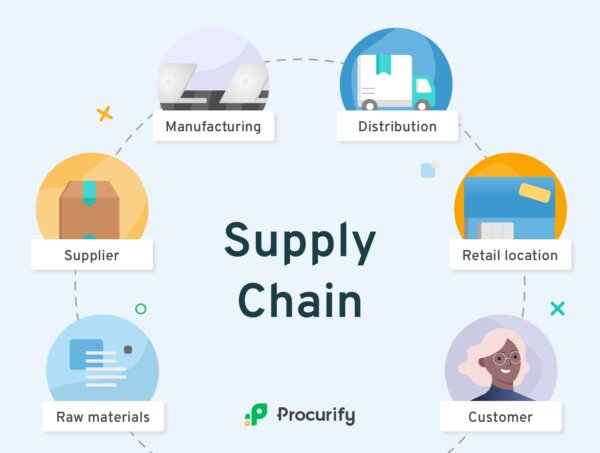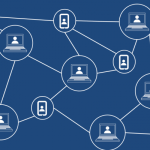The Difference Between Procurement and Supply Chain Management

Understanding the difference between procurement and supply chain management is crucial, as these terms are not interchangeable but they often get mixed up.
Procurement is the process of acquiring the goods your company needs for its business model. Supply chain management is the process of turning those goods into products and distributing them to customers as efficiently as possible.
In this guide, we’ll explain the differences and the relationship between supply chain management and procurement. But first, let’s take a quick look at the roles that procurement, supply chain, and supply chain management play within an organization.
What is Procurement?
Definition
The meaning of procurement when it comes to supply chain management is quite simple. In short, procurement is the process of finding and acquiring the goods and services your company needs to fulfill its business model.
In order for a company to make a profit, the cost of procuring goods and services must be less than the amount it can sell the goods for, minus whatever costs are associated with processing and selling them.
Hence, the goal of procurement management is to ensure that the company (i.e. the buyer) receives goods, services, or works at the best possible price.
To do this effectively, a procurement manager must assess factors like quality, quantity, time, and location on a continual basis, along with negotiating to find the best available pricing (and therefore savings) for the company.
But procurement and supply chain management like this involves a variety of factors. Here are some of the tasks involved in the procurement process:
- Developing standards of quality
- Financing purchases
- Creating purchase orders
- Negotiating price
- Buying goods
- Inventory control
- Inventory management
- Disposal of waste products (e.g. packaging)
- Cost-benefit analysis or cost-utility analysis
It’s also important to note that companies can engage in both direct procurement and indirect procurement. Direct procurement involves expenditure on goods and services that directly impact the company’s bottom line, whereas indirect procurement is expenditure on day-to-day operations and other requirements that do not have a direct impact on company profit.
In the overall supply chain process, procurement’s responsibilities stop once your company has possession of the goods.
Who oversees procurement management?
Companies will typically choose to appoint a procurement manager (or even a procurement team) to oversee the function of procurement. Whereas other companies (particularly software companies) will often assign procurement responsibilities to an office manager or operations manager.
Generally, a procurement manager is responsible for:
- Finding new suppliers
- Locating and acquiring goods and services
- Overseeing sourcing activities
- Negotiating terms and conditions
- Monitoring supplier performance and inventory levels
- Drive cost-saving initiatives
- Make buying decisions under conditions of scarcity
Depending on their company’s size and setup, a procurement manager may also oversee and manage purchasing — an operational role that is often delegated to a purchasing manager in larger organizations.
Supply chain definition
Definition
A supply chain is the network of entities, people, information, resources, and functions that produce a specific product and distributes it to the final buyer.
Understandably, an organization’s supply chain will differ based on the nature of the products or services it sells. It’s also important to remember that when it comes to supply chain management, procurement is only one part of the process.
Supply chains can include entities like:
- Raw material gatherers
- Vendors
- Warehouses
- Producers and manufacturers
- Transportation companies
- Retailers
- Distribution centres
- Wholesale warehouses
- In-house staff
- Stock rooms
- Even the teenage trainee working the register
Supply chains can also include the tasks and functions that contribute to moving that product, such as quality control, market research, procurement, strategic sourcing, operations, distribution, finance, and customer service.
What is supply chain management?
So, if a supply chain is the network of manufacturers, suppliers, and logistics needed to get a specific product to your business and its customers, then what is supply chain management (SCM)?
Definition
At its core, supply chain management is the act of overseeing a supply chain to improve the flow of goods and services and transform raw materials into products for the end buyer.
Supply chain management is a key part of a company’s overall success, as improvements to an organization’s supply chain management strategy can:
- Increase margins and annual revenue
- Improve company’s ability to compete
- Influence customer satisfaction
- Optimize rate of supply
- Reduce costs in several areas of the organization
Who Oversees Supply Chain Management?
Typically, a supply chain manager will oversee all aspects of a company’s supply chain by coordinating the logistics of:
- Supply chain planning and strategy
- Determining the best source of raw materials or services
- Improving efficiency and productivity of the manufacturing process
- Delivery and logistics
- Supplier quality
- Overseeing the return of defective or unwanted products
The goal of a supply chain manager is to implement supply chain management best practices and optimize a company’s supply chain strategy in order to:
- Improve the flow of goods and services
- Minimize shortages
- Keep costs down
- Make recommendations that improve productivity, quality, and efficiency of company operations
- Maintain the desired quality of production
- Ensure that all suppliers and manufacturers in the supply chain are engaged in ethical business practices
The latter is a significant issue faced by many organizations today. If a piece (or pieces) of a supply chain isn’t conducting business in an ethical manner (think child labor or environmental damage) then the organization receiving goods from that supply chain can suffer negative repercussions as a result.
Procurement vs Supply Chain Management: What’s the Difference?
While there is a direct relationship between procurement and supply chain management, the two functions are not interchangeable.
Procurement is the process of getting the goods and materials your company needs, while supply chain management is the process of transforming those goods into products and distributing them to customers as efficiently as possible.
Understanding the difference will help you better leverage the efficiencies and benefits that procurement and supply chain management can bring to your organization.
Procurify helps organizations regain control of their spending with cloud-based procurement software that integrates perfectly with any accounting system. If you’re looking for a better way to manage purchasing, procurement, and spending in your company, request a demo and see how Procurify can help.
Source : procurify.com



